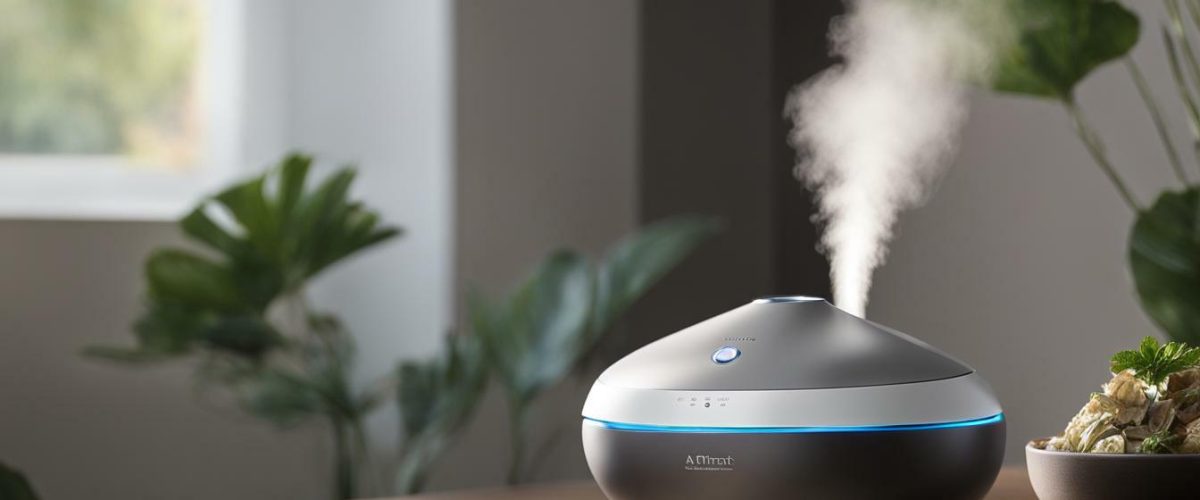Welcome! As a professional copywriting journalist, I believe that good health and well-being are essential for a happy life. This is why I want to introduce you to something that has the power to improve your quality of life – an air humidifier.
An air humidifier is a device that increases the level of moisture in the air, making it easier to breathe and providing numerous health benefits. If you live in a dry climate or spend a lot of time in air-conditioned or heated environments, an air humidifier can make a significant difference in your overall comfort level.
Read on to learn more about air humidifiers and how they can improve your quality of life.
- An air humidifier can increase the level of moisture in the air, providing numerous health benefits.
- If you live in a dry climate or spend a lot of time in air-conditioned or heated environments, an air humidifier can make a significant difference in your overall comfort level.
- Continue reading to learn more about the benefits of using an air humidifier.
Understanding the Basics of Air Humidifiers
If you’re considering purchasing an air humidifier, it’s essential to understand how they work and the different types available. Room humidifiers are designed to add moisture to the air, creating a more comfortable and healthy environment. They do this by releasing water vapor into the air, increasing humidity levels and reducing dryness.
There are several types of air humidifiers available on the market, each with their unique benefits. Cool mist humidifiers use a fan to evaporate water, creating a refreshing mist that cools the air. Ultrasonic humidifiers use high-frequency vibrations to transform water into a fine mist. They are quieter than other types of humidifiers and consume less energy.
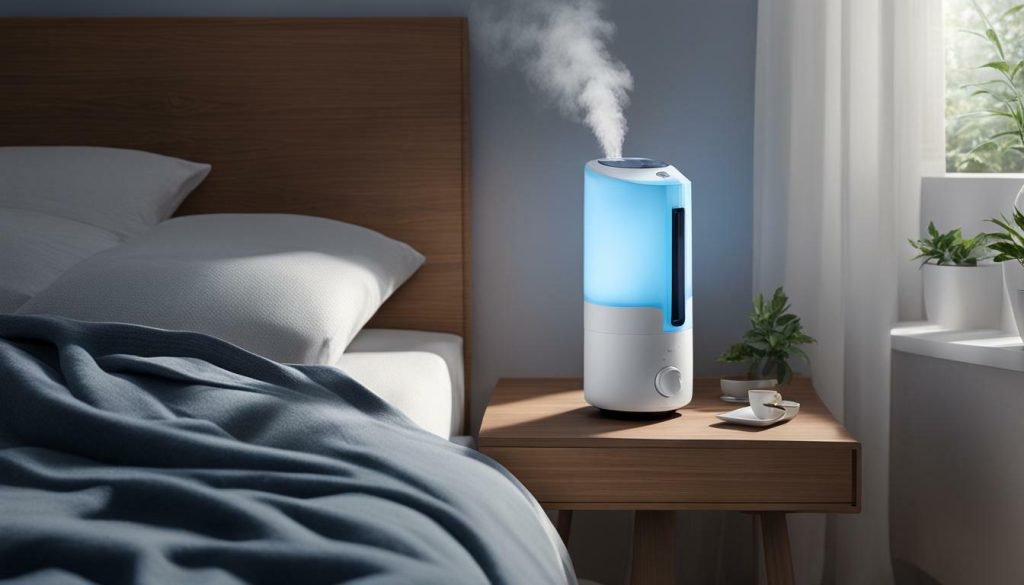
Evaporative humidifiers use a wick or filter to absorb water, which is then evaporated into the air with the help of a fan. They are energy-efficient and effective at maintaining a consistent level of humidity in the room. Steam humidifiers boil water to produce steam, which is then released into the air. They are ideal for larger rooms and offer the added benefit of killing bacteria and other harmful contaminants.
Benefits of Different Types of Humidifiers
| Type of Humidifier | Benefits |
|---|---|
| Cool Mist Humidifier | Helps alleviate allergy and asthma symptoms, relieves dry skin, and reduces static electricity |
| Ultrasonic Humidifier | Quiet operation, energy-efficient, safe for use around children and pets |
| Evaporative Humidifier | Energy-efficient, maintains a consistent level of humidity, helps alleviate respiratory conditions |
| Steam Humidifier | Kills bacteria and other contaminants, ideal for larger rooms and cold climates |
Regardless of the type of humidifier you choose, it’s essential to maintain proper humidity levels for optimal health and comfort. Humidity levels between 30% and 50% are recommended for most households. Using a hygrometer can help you monitor humidity levels in your home and adjust your humidifier setting accordingly.
In the next section, I will guide you through the process of choosing the right air humidifier to meet your specific needs and preferences.
Choosing the Right Air Humidifier for Your Needs
When it comes to finding the perfect air humidifier, there are several factors to consider. One of the most important things to think about is the size of the room you want to humidify. A larger room requires a more powerful humidifier to effectively regulate humidity levels. On the other hand, a smaller room can benefit from a more compact model.
Noise level is another important consideration, especially if you plan to use the humidifier in a bedroom or other quiet space. Look for a model with a low decibel rating to minimize disruption to your daily routine.
If you’re constantly on the move or want the flexibility to use your humidifier in different rooms, a portable humidifier may be the best option. These models are often battery operated and compact, making them ideal for travel or small spaces.
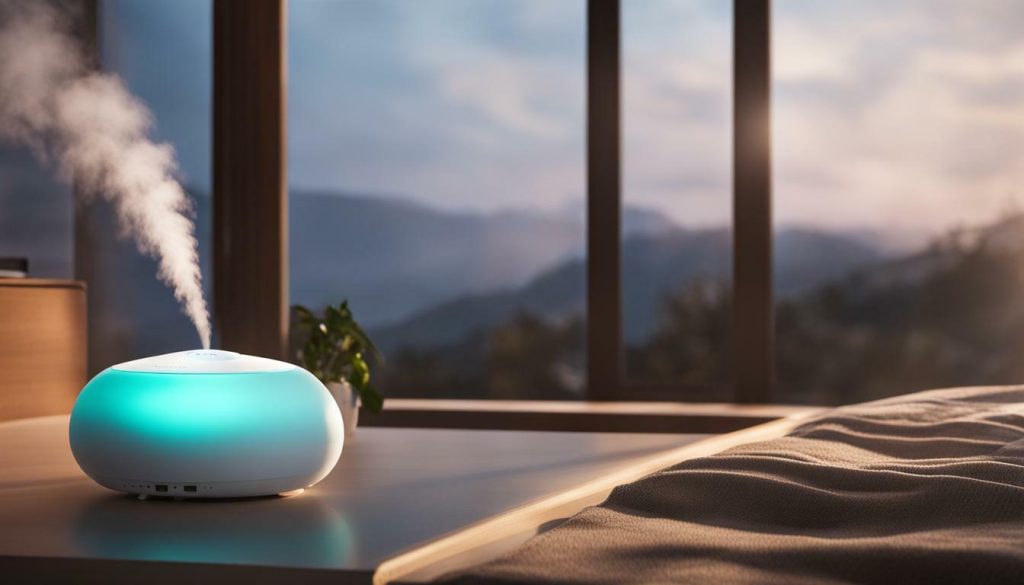
Additional features to look for include automatic shut-off and easy-to-clean designs. Some models even have built-in air purifiers or ionizers to further improve indoor air quality.
The Benefits of Using an Air Humidifier
As someone who has struggled with allergies and respiratory issues, I can attest to the incredible benefits of using an air humidifier. Not only does it provide relief from dry air and uncomfortable symptoms, but it can also improve overall health and well-being. Here are some of the top benefits of using an air humidifier:
- Relieves Allergies: Dry air can worsen allergies by causing irritation and inflammation in the nasal passages and throat. A humidifier adds moisture to the air, helping to alleviate these symptoms and improve breathing.
- Improves Skin Health: Dry air can also lead to dry, itchy skin. A humidifier can help prevent this by keeping the air moist and hydrated, promoting healthy skin.
- Reduces Risk of Infections: Moist air can help keep the mucous membranes in our nasal passages and throats moist, making it more difficult for viruses and bacteria to penetrate and cause infection.
- Provides Comfortable Living Environment: Humidifiers can create a more comfortable living environment by reducing static electricity, preventing damage to wood furniture, and reducing snoring by keeping nasal passages moist.
- Alleviates Respiratory Conditions: Many respiratory conditions such as asthma, bronchitis, and sinusitis can be exacerbated by dry air. A humidifier can help alleviate these conditions by keeping the air moist and reducing irritation in the respiratory system.
If you suffer from allergies or respiratory issues, a humidifier can be an invaluable addition to your home. Not only can it provide relief from uncomfortable symptoms, but it can also improve overall health and well-being. Consider investing in a humidifier today to experience the numerous benefits it has to offer.
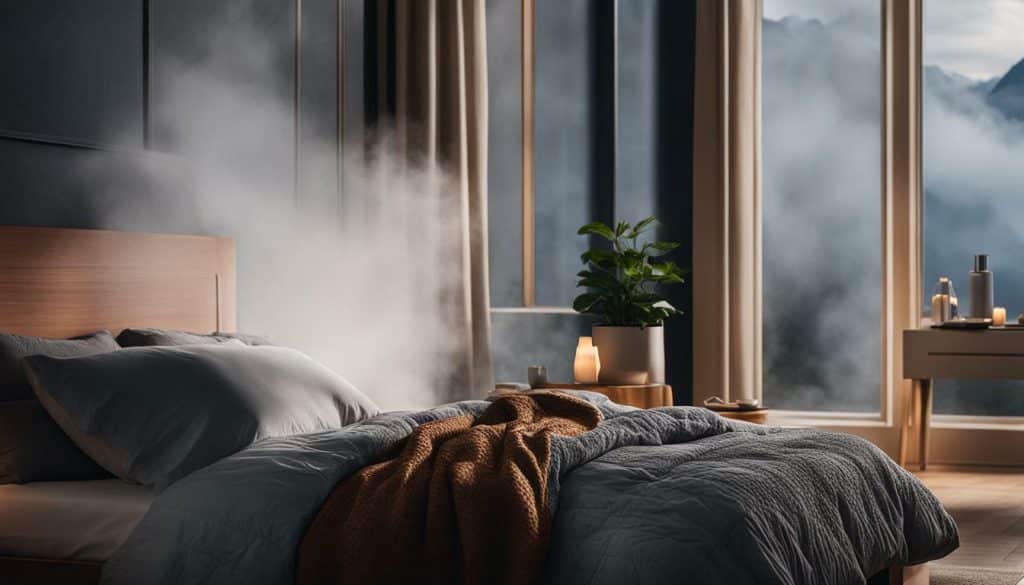
As a new parent, I understand how important it is to keep your baby comfortable and healthy. That’s why I highly recommend using a humidifier in your baby’s room. A room humidifier can help alleviate congestion, soothe dry skin, and create a calming sleep environment for your little one.
One of the key benefits of using a humidifier for your baby is its effectiveness in combating congestion. Dry air can cause nasal passages to become dry and irritated, leading to congestion and difficulty breathing. A humidifier can moisten the air, easing congestion and allowing your baby to breathe with ease.
Additionally, a humidifier can help soothe dry skin, which is especially common during the winter months when indoor heating can dry out the air. Using a humidifier in your baby’s room can help keep their skin hydrated and prevent itchiness and discomfort.
When choosing a room humidifier for your baby, it’s essential to find one that is safe, easy to use, and provides the right level of humidity for your baby’s needs. Look for a humidifier that has a cool mist feature, as this is safer than a warm mist option. It’s also essential to find a humidifier that is easy to clean and maintain.
Overall, a humidifier can be a vital tool in enhancing your baby’s comfort and health. With its ability to alleviate congestion, soothe dry skin, and create a calming environment, it’s worth investing in a high-quality room humidifier. Try the Crane Drop Ultrasonic Cool Mist Humidifier for reliable and safe performance.
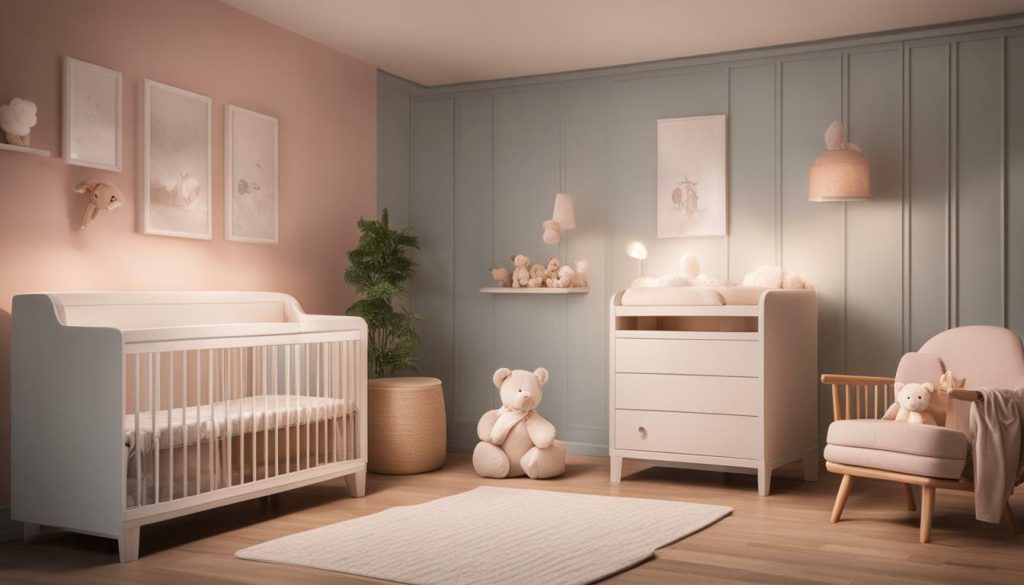
If you’re looking for a more comprehensive solution to regulate humidity levels throughout your home, consider investing in a whole house humidifier. As the name suggests, this type of humidifier is designed to provide humidity control for the entire home, rather than just one room.
Whole house humidifiers can be particularly beneficial for individuals with allergies or respiratory issues, as they can help to reduce allergens and airborne viruses. These systems work by distributing moisture throughout the house’s ductwork, creating a consistent level of humidity in every room.
One of the main advantages of whole house humidifiers is convenience. Unlike portable humidifiers, they require little maintenance and can be integrated with your home’s HVAC system. This means you won’t have to worry about refilling the water tank or moving the humidifier from room to room.
Whole house humidifiers also tend to be more energy-efficient than portable options, as they can humidify a larger space with less power. This makes them a cost-effective way to maintain a comfortable home environment.
When choosing a whole house humidifier, consider factors such as the size of your home and the type of humidifier that best suits your needs. Some popular options include bypass humidifiers, fan-powered humidifiers, and steam humidifiers.
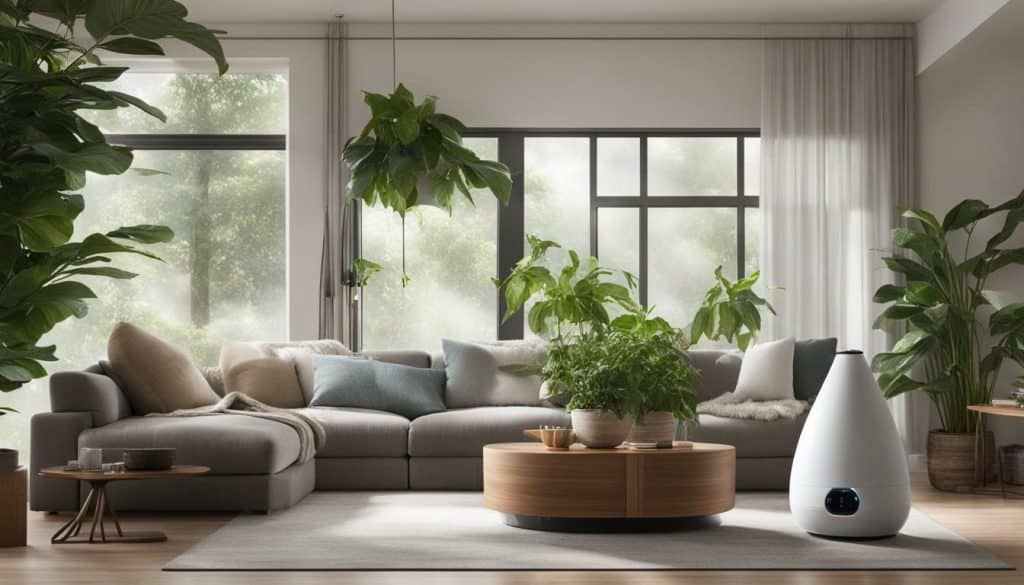
If you suffer from allergies, finding the right air humidifier can make a dramatic difference in your quality of life. An air humidifier can help keep allergens at bay and create a more comfortable living environment.
When choosing a humidifier for allergies, there are a few key features to look for. First, consider the type of humidifier you need. Cool mist humidifiers are generally recommended for allergy sufferers since they don’t produce as much moisture as warm mist humidifiers, which can lead to mold growth.
Next, take a look at the humidifier’s filter. An air humidifier with a HEPA filter can trap even the smallest particles, such as pet dander, pollen, and dust mites, making it an ideal choice for allergy sufferers. Some humidifiers also have additional filters or features, such as UV lights, to further reduce allergens.
When looking for the best air humidifier for allergies, it’s also helpful to read reviews from other allergy sufferers. Look for humidifiers with high ratings and positive feedback from customers who suffer from similar allergies.
One top-rated option for allergy relief is the Vicks Warm Mist Humidifier, which has a medicine cup for added decongestant relief. Another highly recommended option is the Honeywell HCM350W Germ Free Cool Mist Humidifier, which has a UV light that kills up to 99.9% of bacteria, mold and fungus in the water.
Overall, investing in a high-quality air humidifier can be a game-changer for allergy sufferers. By reducing allergens and maintaining a comfortable living space, you’ll be able to breathe easier and enjoy a higher quality of life.
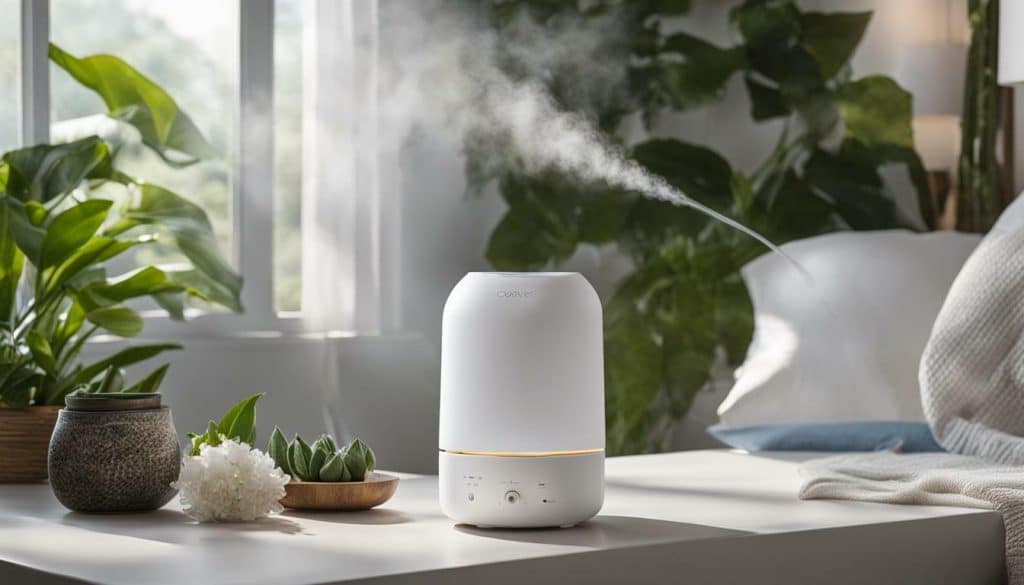
So you’ve invested in an air humidifier – great choice! Now, it’s important to ensure that you’re maximizing the benefits of this valuable tool. Here are some tips and tricks to get the most out of your air humidifier:
Proper Maintenance
Maintaining your air humidifier is crucial for optimal performance. Be sure to follow the manufacturer’s instructions for cleaning and replacing filters. It’s recommended to clean your humidifier every three days to prevent the buildup of bacteria and mold. Use distilled or demineralized water to avoid mineral buildup and to prolong the life of your humidifier.
Ideal Humidity Levels
The ideal indoor humidity level is between 30-50%. Use a hygrometer to measure the humidity in your home, and adjust the settings on your humidifier accordingly. It’s important to avoid over-humidification, which can lead to condensation and mold growth. On the other hand, too little humidity can cause dry skin, nasal congestion, and other discomforts.
Placement Suggestions
Where you place your air humidifier can also impact its effectiveness. It’s best to place it in a central location, away from walls and other obstructions. Keep it at least a few feet away from electronics, as the moisture can damage them. For larger rooms, consider using multiple humidifiers to cover more ground.
By following these tips, you can maximize the benefits of your air humidifier. Enjoy improved air quality, reduced allergies and respiratory issues, and overall enhanced well-being.
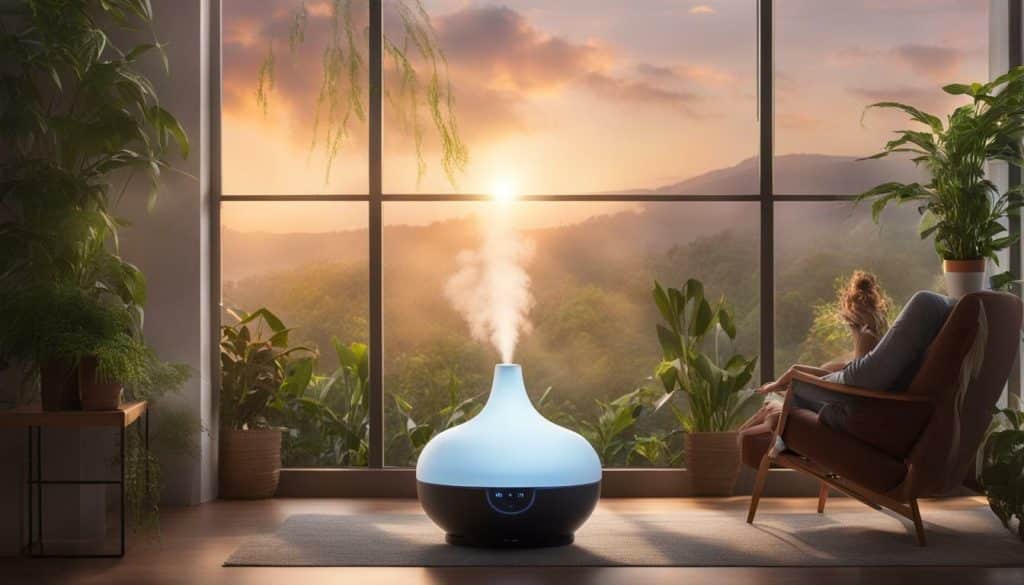
If you decide to use a room or portable humidifier, it is essential to take safety measures to avoid any accidents or harm. Here are some tips on how to use an air humidifier safely:
- Always use distilled water to avoid any mineral build-up and bacteria growth.
- Don’t leave the humidifier unattended while it’s on.
- Keep the humidifier out of reach of children and pets.
- Place the humidifier on a flat surface to avoid tipping over.
- Don’t over-humidify the room, as it can cause excessive moisture and mold growth.
- Clean the humidifier regularly, following the manufacturer’s instructions.
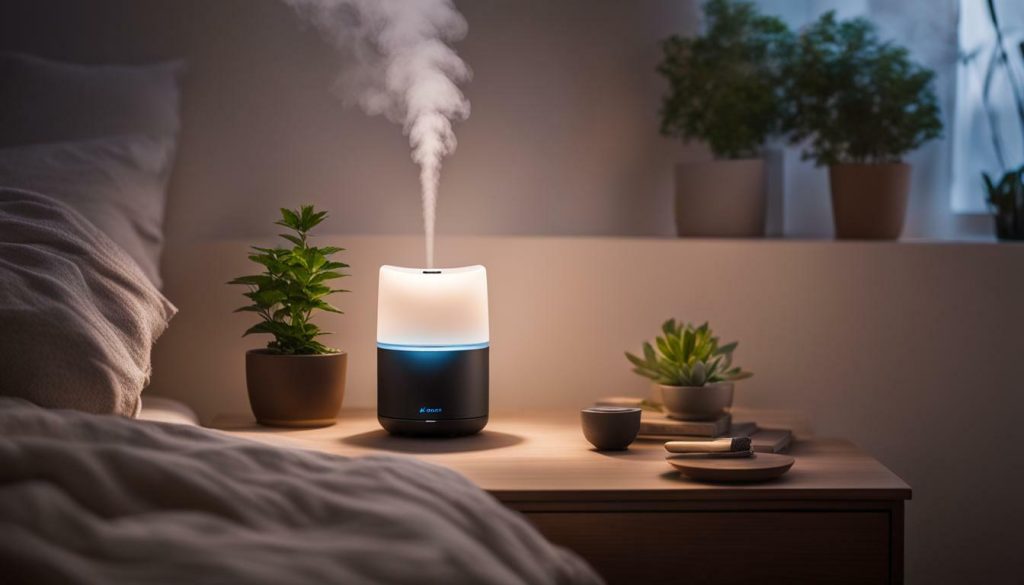
Remember, always prioritize safety when using a humidifier to ensure the best results. With proper use, a humidifier can provide numerous benefits to your health and environment.
Maintaining Your Air Humidifier for Long-Term Use
Proper maintenance is key to ensuring your air humidifier lasts for years to come. Regular cleaning and filter replacements will keep it running efficiently and prevent the buildup of mold and bacteria.
Tip #1: Clean your humidifier weekly. Fill the tank with water and add a few drops of white vinegar or a quarter cup of hydrogen peroxide, then let it sit for 30 minutes. Rinse the tank thoroughly and wipe it dry before use.
Tip #2: Change the filter regularly. For cool mist humidifiers, change the filter every 3 months or as recommended by the manufacturer. For room humidifiers, replace the filter every 1-2 months. This will ensure the air flow remains clean and pure.
Tip #3: Keep your humidifier dry when not in use. Mold and bacteria thrive in wet environments, so store your humidifier in a dry place when not in use. Do not let water sit in the tank for more than 24 hours.
Tip #4: Refill the tank with clean water every time. Do not add medication, essential oils, or other substances to the water tank. This can damage the humidifier and affect the purity of the air it releases.
By following these simple maintenance tips, you can ensure your air humidifier remains efficient and reliable, providing you with clean, comfortable air for years to come.
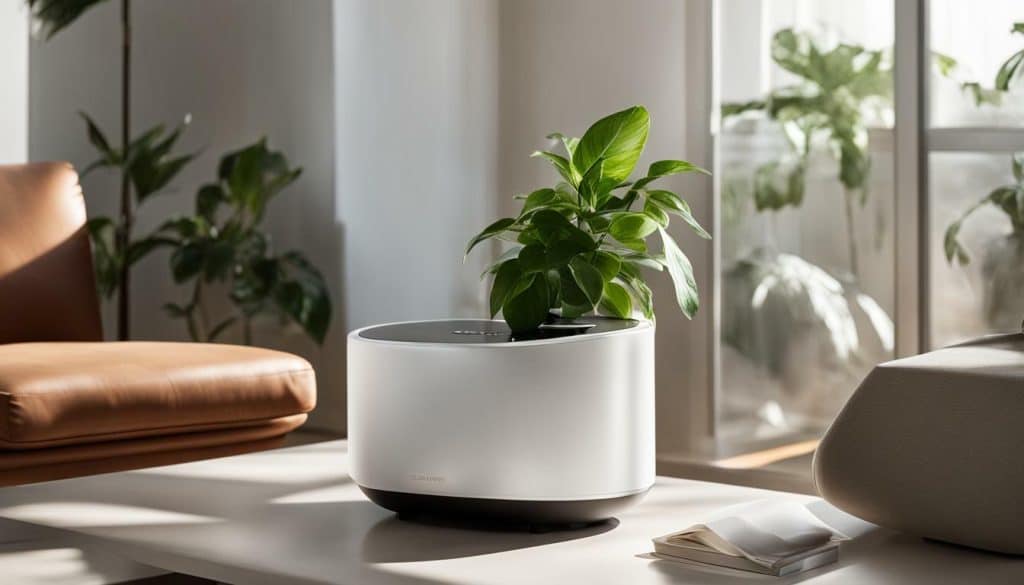
Conclusion
Using an air humidifier is an easy and effective way to improve the quality of your life. By maintaining the proper moisture levels in your home or office, you can enjoy a variety of health benefits, including relief from allergies and respiratory conditions, improved skin health, and more comfortable living spaces.
Investing in the right air humidifier for your needs is crucial. Consider factors such as room size and noise level, and opt for a portable humidifier if flexibility is important to you.
Remember, proper maintenance is key in ensuring your air humidifier remains efficient and reliable for long-term use. Follow the cleaning routines, change the filters and troubleshoot any issues if needed.
Most importantly, always take safety precautions when using your air humidifier. Use distilled water, avoid over-humidification, and keep the device out of reach of children.
In summary, investing in an air humidifier is a smart decision that can significantly enhance your overall well-being. Take advantage of the numerous benefits that come with using an air humidifier, and maximize your experience by following maintenance and safety tips. Enjoy the better quality of air with an air humidifier in your home or office today!
FAQ
What is an air humidifier?
An air humidifier is a device that adds moisture to the air in your home or office. It helps to increase humidity levels, which can have various benefits for your health and well-being.
How does an air humidifier work?
Air humidifiers work by either evaporating water into the air or creating and distributing a fine mist. This process helps to increase the moisture content in the surrounding environment, making the air more comfortable to breathe.
What are the different types of air humidifiers?
There are several types of air humidifiers available, including cool mist humidifiers, warm mist humidifiers, and ultrasonic humidifiers. Each type has its own advantages and is suited for different preferences and needs.
How do I choose the right air humidifier for my needs?
When choosing an air humidifier, consider factors such as room size, noise level, and additional features like automatic shut-off or adjustable humidity settings. It’s also important to find a model that fits your specific needs, whether it’s for a baby’s room, allergies, or whole-house humidification.
What are the benefits of using an air humidifier?
Using an air humidifier can help alleviate allergies, improve respiratory health, prevent dry skin and lips, reduce snoring, and create a more comfortable living environment. It can also help maintain the condition of wooden furniture and prevent static electricity.
Can I use a humidifier in a baby’s room?
Yes, using a humidifier in a baby’s room can be beneficial. It can help relieve congestion, soothe dry skin, and create a calm and comfortable sleep environment for your baby. Just make sure to follow safety guidelines and use a cool mist humidifier.
What are whole house humidifiers?
Whole house humidifiers are installed directly into your home’s HVAC system and work to consistently regulate humidity levels throughout the entire house. They provide a more comprehensive solution for maintaining optimal humidity levels compared to single-room humidifiers.
What is the best air humidifier for allergies?
The best air humidifier for allergies depends on individual preferences and needs. Look for features like HEPA filters, adjustable humidity settings, and easy maintenance. Reading customer reviews and consulting with a healthcare professional can also help you find the right humidifier for your allergies.
How can I maximize the benefits of my air humidifier?
To maximize the benefits of your air humidifier, regularly clean and maintain it according to the manufacturer’s instructions. Maintain the ideal humidity level in your living environment, place the humidifier in an appropriate location, and use distilled water for optimal performance.
How do I use an air humidifier safely?
To use an air humidifier safely, make sure to follow the manufacturer’s instructions, use distilled water to prevent mineral buildup, clean the humidifier regularly, and keep it out of the reach of children. Avoid over-humidification, as excessive moisture can lead to mold growth.
How do I maintain my air humidifier for long-term use?
Regular maintenance is key to prolonging the life of your air humidifier. Clean the unit regularly, change filters as recommended by the manufacturer, and address any issues promptly. Refer to the user manual for specific instructions on cleaning and maintenance for your specific model.



